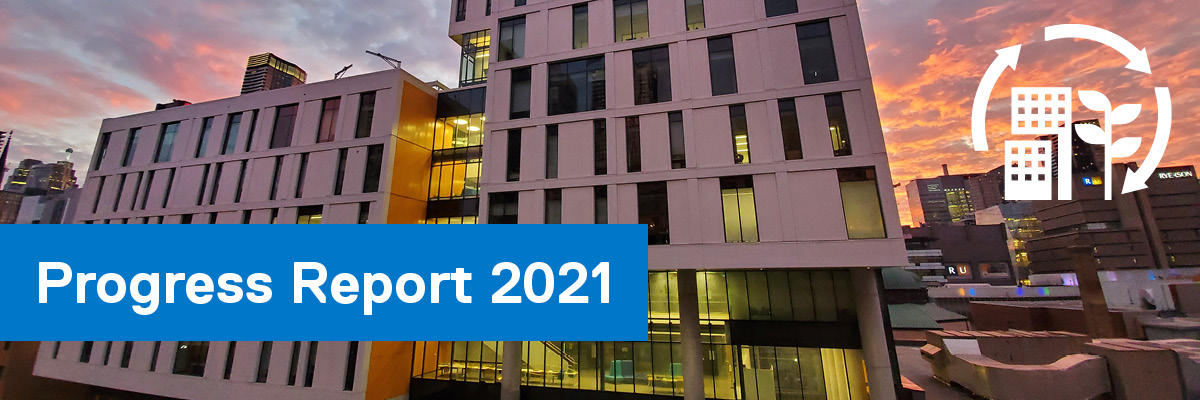Climate & Energy

The Sustainability Office completes a greenhouse gas (GHG) emissions inventory each year to track Scope 1, 2, and 3 emissions.

Scope 1
emissions
Produced directly by sources owned or controlled by an organization (natural gas boilers and diesel generators)

Scope 2 emissions
Produced indirectly by products or services purchased by an organization (electricity and district steam)

Scope 3 emissions
All other indirect emissions produced as a result of an organization's activities and operations (waste and business travel)
Annual GHG emissions inventory
The most recent GHG inventory, completed for the 2019/2020 academic year shows the following:
- Total GHG emissions (including all 3 scopes) for the 2019/2020 academic year was 16,057 tonnes CO2e, down 4.7% from the previous year. Note that this reduction may be attributed to the campus shutdown at the end of the winter 2020 semester as a result of the COVID-19 pandemic.
- Between 2014/2015 - 2019/2020, we’ve seen a 3.8% increase in TMU’s total GHG emission (including all 3 scopes).

TMU’s annual GHG emissions trend

This bar graph shows TMU's annual greenhouse gas (GHG) emissions trend from 2014 to 2020 measured in tCO2e (tonnes of carbon dioxide equivalent).
| Scope 1 GHG Inventory Data |
2014/ 2015 |
2015/ 2016 |
2016/ 2017 |
2017/ 2018 |
2018/ 2019 |
2019/ 2020 |
|---|---|---|---|---|---|---|
| Diesel | 8 | 11 | 2 | 9 | 11 | 18 |
| Natural Gas | 2,715 | 2,242 | 2,187 | 4,010 | 3,126 | 2,868 |
| Scope 2 GHG Inventory Data |
2014/ 2015 |
2015/ 2016 |
2016/ 2017 |
2017/ 2018 |
2018/ 2019 |
2019/ 2020 |
|---|---|---|---|---|---|---|
| Electricity | 2,417 | 2,469 | 2,339 | 1,159 | 1,857 | 1,872 |
| Steam | 9,357 | 8,053 | 7,775 | 8,650 | 8,983 | 8,699 |
| Chilled Water | 14 | 27 | 27 | 22 | 28 | 10 |
| Scope 3 GHG Inventory Data |
2014/ 2015 |
2015/ 2016 |
2016/ 2017 |
2017/ 2018 |
2018/ 2019 |
2019/ 2020 |
|---|---|---|---|---|---|---|
| Business Air Travel | 1,286 | 1,473 | 1,424 | 1,894 | 1,951 | 1,759 |
| Business Travel (Mileage+Car Rental+Taxi) | 328 | 438 | 489 | 615 | 582 | 502 |
| Landfill | 312 | 453 | 464 | 297 | 313 | 330 |
| Commuting (Faculty/Staff/Students Estimates) | 7,959 | 8,321 | 8,724 | 8,944 | 9,211 | 9,253 |
While over the past 5 years, many projects have been completed on campus to improve energy efficiency, reductions may have been offset by the addition of new buildings (e.g the Daphne Cockwell Health Sciences Complex (DCC) opened in August 2019) and our growing campus population. It is also important to note that our calculations did not take into account yearly GHG emissions fluctuations due to weather conditions.
This figure provides a breakdown of GHG emission sources on campus for the 2019/2020 fiscal year (excluding commuting-related emissions). As shown, steam and natural gas, which are used for heating buildings and water on campus, contribute significantly to our carbon footprint. As such, steam and natural gas consumption must be considered in our emissions reduction efforts.

GHG emission sources on campus - 2019/2020 fiscal year

This chart compares the GHG emission sources on campus in the 2019/2020 fiscal year. 54% steam, 18% natural gas, 12% electricity, 11% business air travel, 3% business travel, 2% landfill.
| GHG Emission Source on Campus | Percentage of Total Emissions |
|---|---|
| Steam | 54% |
| Electricity | 12% |
| Natural gas | 18% |
| Business air travel | 11% |
| Business travel | 3% |
| Landfill | 2% |


Green Will Initiative
In April 2020, TMU joined the Green Will Initiative (external link) (GWI), a voluntary program of the City of Toronto that seeks to accelerate GHG emissions reduction in buildings across Toronto to achieve net-zero. Through its participation in the GWI, TMU has committed to working with the City to develop Pathway to Net Zero Plans that include establishing goals and actions to reduce the carbon footprint of its buildings. Since joining, TMU’s Sustainability Office has been an active member in the program and has been working with the City and other GWI members through its participation in collaborative meetings, knowledge sharing events and training.

Climate and Energy Working Group
In Fall 2020, the Sustainability Office established a Climate and Energy Working Group composed of staff, students and faculty. The goals of the working group are to develop institutional GHG emission reduction targets and a plan to achieve the recommended targets. The Working Group held its first meeting in November 2020 and has held bimonthly meetings thereafter.
